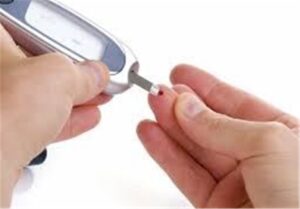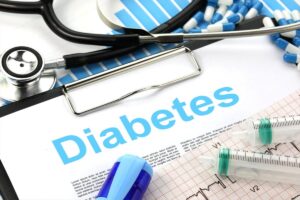High blood sugar, also known as hyperglycemia, occurs when your blood glucose (sugar) level rises above normal. This can happen for a variety of reasons, including insufficient insulin production, insulin resistance, stress, infections, or certain medications. Over time, consistently high blood sugar levels can lead to long-term complications and may indicate a more serious condition like prediabetes or type 2 diabetes. Below are 12 common signs that your blood sugar may be higher than it should be, followed by 8 key symptoms often associated with diabetes.

12 Alarming Signs Your Blood Sugar Is High
- Frequent Urination (Polyuria)
When blood sugar levels remain high, the kidneys work overtime to filter and remove excess glucose. As a result, you may experience more frequent and urgent trips to the bathroom, particularly at night. This sign is often one of the earliest clues that your blood sugar is creeping up. - Increased Thirst (Polydipsia)
Because you are losing more fluids through frequent urination, your body tries to compensate for this fluid loss by triggering a stronger thirst response. You may find yourself reaching for water more often, feeling constantly parched regardless of how much you drink. - Excessive Hunger (Polyphagia)
The body relies on glucose as a primary source of energy. When insulin is not functioning properly (or there isn’t enough of it), cells cannot absorb glucose effectively. In response, the body signals the brain that it’s still hungry, even if you’ve already eaten a full meal. - Fatigue and Lethargy
High blood sugar can disrupt the normal flow of glucose into cells, leaving your muscles and organs starved of the fuel they need. As a result, you might feel persistently tired, lethargic, or unusually sluggish during your daily activities. - Blurred Vision
Elevated blood sugar can cause the lenses of your eyes to swell, temporarily altering their shape. This often leads to blurred or distorted vision. While this can sometimes be reversed if your blood sugar returns to normal levels, chronic hyperglycemia can also contribute to longer-term vision problems. - Slow-Healing Wounds
Too much glucose in the bloodstream can interfere with proper circulation, depriving cells and tissues of nutrients and oxygen needed for repair. Consequently, you may notice that cuts, bruises, or sores take noticeably longer to heal. - Frequent Infections
High blood sugar creates an environment in which bacteria and fungi can thrive. You may experience repeated infections—particularly urinary tract, gum, or skin infections. If you find yourself frequently battling these issues, it’s worth investigating whether high blood sugar is a contributing factor. - Dry Mouth and Skin
Frequent urination can lead to dehydration, which often causes symptoms like dry mouth and itchy, flaky skin. Additionally, changes in blood sugar levels can affect the skin’s ability to retain moisture, compounding the problem. - Tingling or Numbness in Hands and Feet
Nerve damage (neuropathy) is a common complication of long-term high blood sugar. Early signs include a tingling, burning, or numbing sensation in the extremities, especially the hands and feet. Over time, this can become more pronounced and may lead to chronic pain or loss of sensation. - Irritability and Mood Swings
Fluctuations in blood sugar can wreak havoc on mood. You might find yourself feeling unusually irritable, anxious, or even depressed. While many factors can affect mood, unexplained mood swings might be a clue that your blood sugar is out of balance. - Headaches
Both high and low blood sugar can trigger headaches. If you’re consistently dealing with headaches alongside other symptoms like excessive thirst or frequent urination, it might be related to your body’s difficulty in regulating glucose levels. - Unintentional Weight Loss
When your cells are not able to use glucose effectively for energy, your body may begin burning fat and muscle tissue instead. This can lead to sudden or unintentional weight loss, even if you have not changed your exercise or diet routine.
8 Diabetes Symptoms to Watch Out For
If you are experiencing some of the signs above consistently, or in combination, it’s crucial to check whether you are developing diabetes. There are three main types of diabetes: type 1, type 2, and gestational diabetes. Although each type has unique characteristics, some common symptoms overlap. Below are 8 key symptoms often associated with diabetes:

- Persistent High Blood Sugar
Chronic hyperglycemia is the main hallmark of diabetes. Over time, persistently elevated glucose levels can damage blood vessels, nerves, and various organs. Regular monitoring via blood tests is essential if you have a family history of diabetes or other risk factors. - Frequent Urination and Thirst
As discussed, polydipsia (excessive thirst) and polyuria (frequent urination) are two of the most classic symptoms of diabetes. When blood sugar levels are high, the body expels glucose through urine, dragging valuable fluids with it. - Extreme Fatigue
Feeling tired all the time can be a direct result of your body’s inability to convert glucose into energy effectively. This symptom can be especially pronounced in type 2 diabetes, where insulin resistance gradually worsens. - Weight Changes (Gain or Loss)
In type 1 diabetes, insufficient insulin production can lead to dramatic weight loss because the body starts breaking down fat and muscle as an alternative energy source. In contrast, type 2 diabetes is often associated with weight gain and obesity, which can increase insulin resistance. - Blurred Vision
Diabetes can affect the eyes in multiple ways, including swelling of the lens or changes in the blood vessels of the retina. Prolonged high blood sugar can lead to vision issues that become more serious over time, such as diabetic retinopathy. - Slow-Healing Cuts and Infections
Persistent high blood sugar can impair circulation and reduce the effectiveness of your immune system, making it harder for the body to fend off infections and heal wounds. People with diabetes often experience recurrent skin infections, gum problems, and slower-than-normal wound healing. - Tingling or Numbness (Peripheral Neuropathy)
Nerve damage can manifest as tingling, numbness, or shooting pains, usually starting in the feet and hands. This is because high glucose levels can wear down the tiny blood vessels (capillaries) that supply nerves, causing reduced blood flow and eventual nerve dysfunction. - Increased Hunger
Even if you’re eating regularly, high blood sugar can prevent your cells from getting the energy they need, sending signals to your brain that you’re still hungry. This leads to a cycle of overeating and elevated blood sugar, which can exacerbate the progression of type 2 diabetes.
What to Do If You Notice These Signs
If you find that you’re experiencing multiple symptoms of high blood sugar or suspect that you might have diabetes, it is important to seek medical advice. A healthcare professional can conduct simple blood tests—such as a fasting blood glucose test, an HbA1c test, or an oral glucose tolerance test—to assess your blood sugar levels. Early diagnosis and proactive management can help prevent or delay the onset of serious complications such as nerve damage, kidney disease, or cardiovascular issues.
Lifestyle Adjustments
- Balanced Diet: Focus on whole grains, lean proteins, healthy fats, and plenty of fruits and vegetables. Minimizing sugary drinks and processed foods can also help maintain more stable blood glucose levels.
- Regular Exercise: Engaging in moderate physical activities like walking, jogging, or cycling can help improve insulin sensitivity, assist with weight management, and boost overall cardiovascular health.
- Monitoring and Medications: If you’re diagnosed with diabetes, your doctor may prescribe oral medications or insulin therapy. Monitoring your blood glucose at home helps you and your healthcare provider adjust your treatment plan as needed.
- Stress Management: Chronic stress can raise cortisol levels, which in turn can increase blood glucose. Techniques like mindfulness, meditation, and regular exercise can help lower stress and stabilize blood sugar levels.
Final Thoughts
High blood sugar is not something to ignore. Whether it’s triggered by stress, diet, or an underlying medical condition like diabetes, the negative effects of chronically elevated glucose levels can be profound. Familiarizing yourself with the 12 warning signs of hyperglycemia and the 8 common symptoms of diabetes is a proactive step toward safeguarding your health. If these signs resonate with you or a loved one, consider consulting a healthcare professional for a proper evaluation and guidance on effective management. Early detection, lifestyle modifications, and proper medical care can significantly reduce risks and improve overall quality of life.
Disclaimer: This article is intended for informational purposes only and does not substitute professional medical advice. If you suspect you have issues with high blood sugar or diabetes, please seek evaluation and care from a qualified healthcare provider.
